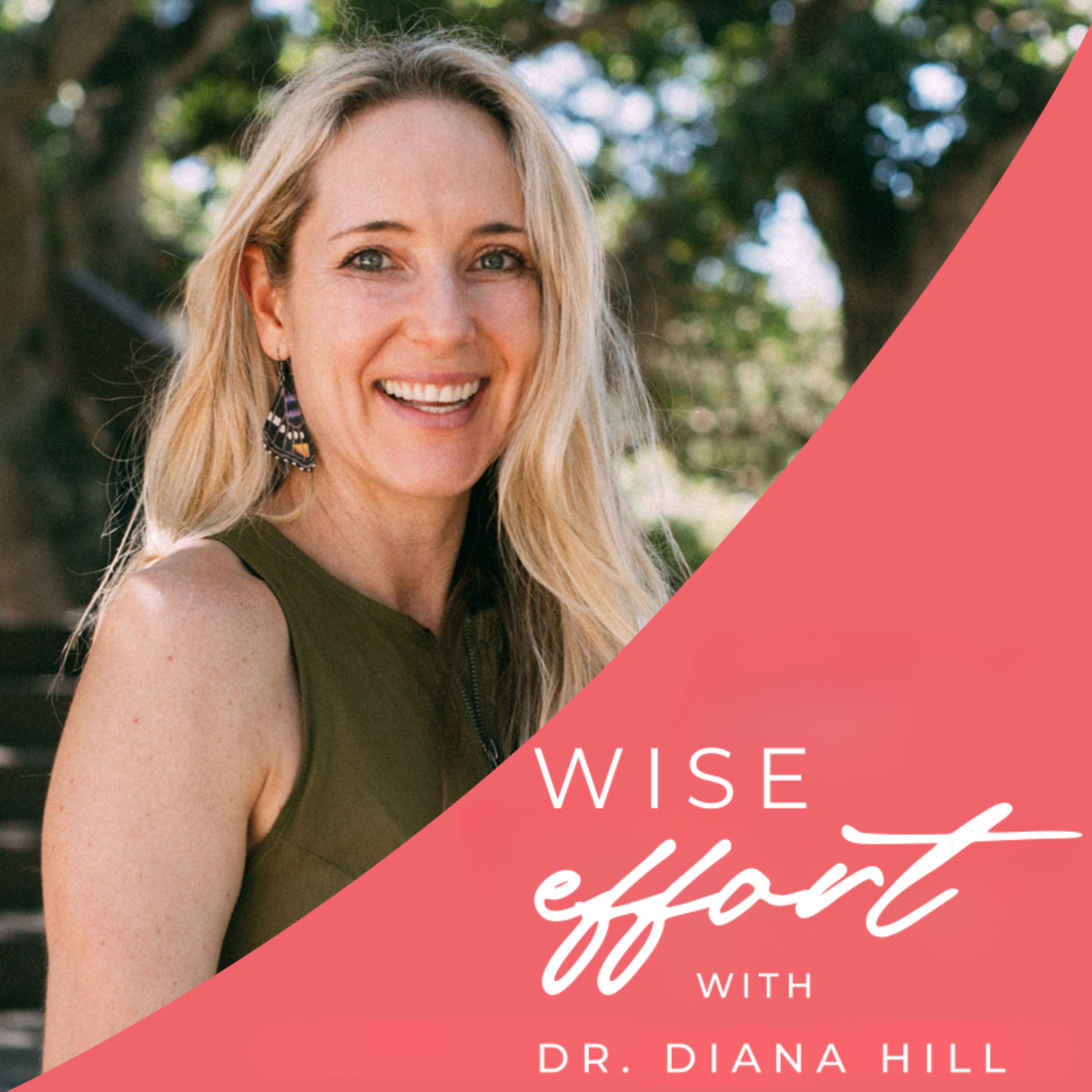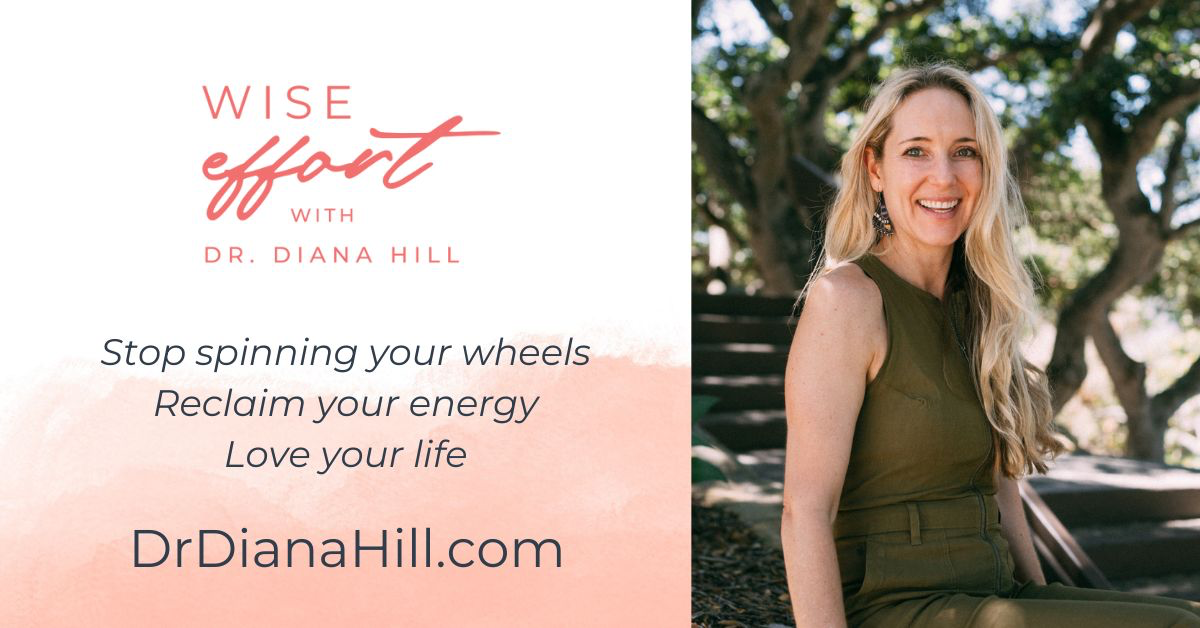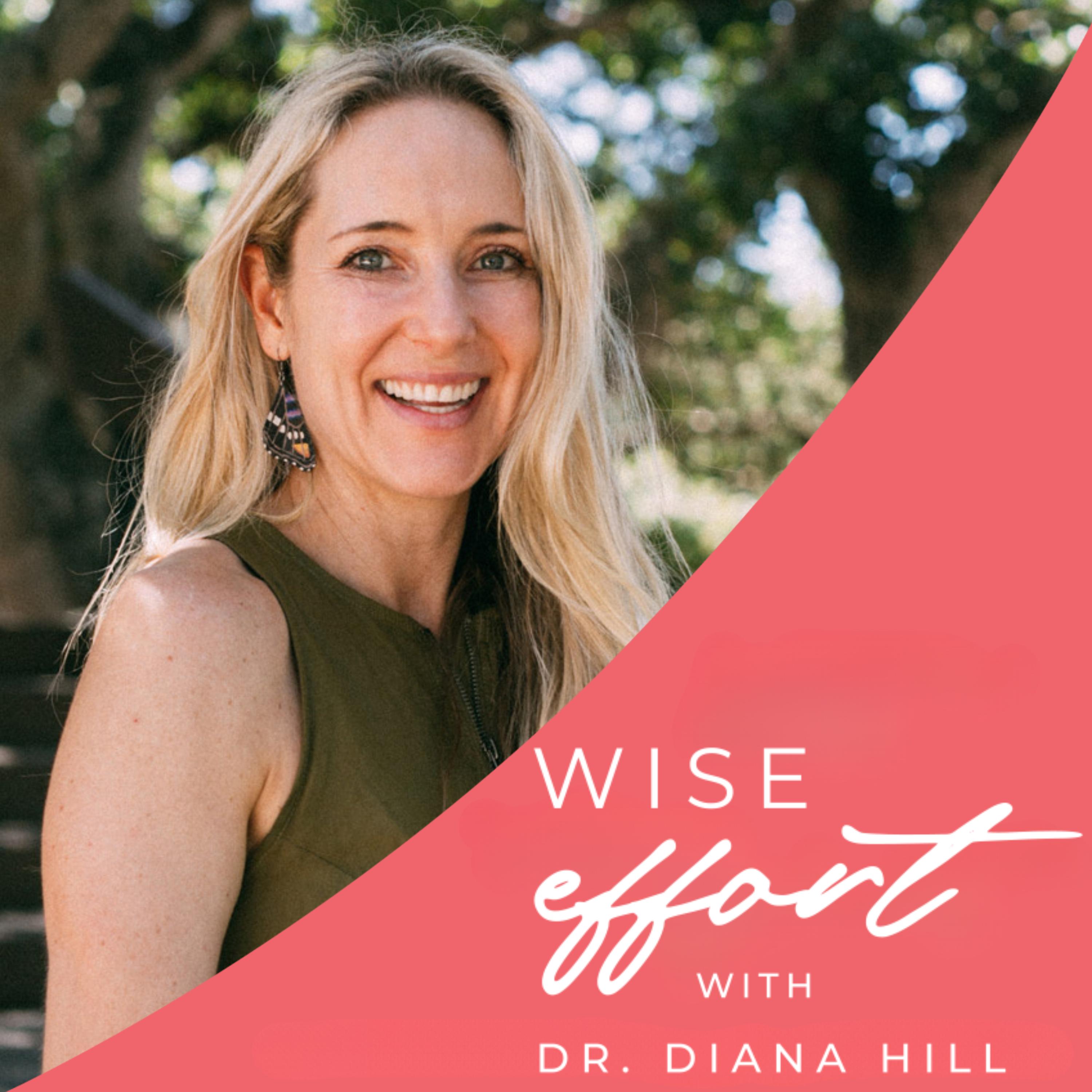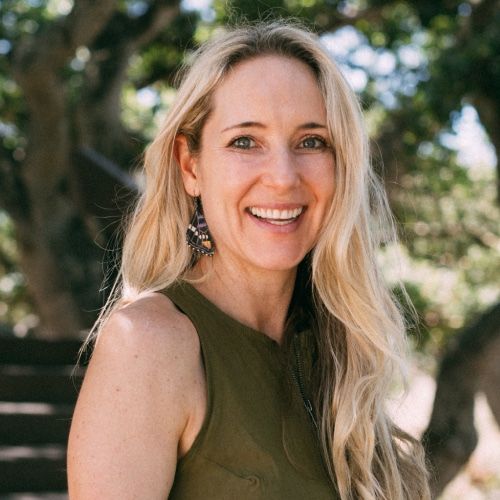Episode 104
The One Skill You Need to Grow Wise
Wise Effort is about putting your energy in places that matter and savoring the good of your life along the way. The Wise Effort show, hosted by Dr. Diana Hill, is for you if you are a high achiever, care about holistic health, believe in science, and are looking for more sustainable and impactful ways of living.
In this episode, Dr. Diana Hill guides you to learn:
- What is Wise Effort and why it matters
- How this show is designed to fit your life
- Why Diana was a late adopter to self-compassion
- One skill to apply in your life right now that will help you grow wiser.
You want to enjoy your life, but also be of service to our greater global community. Join us to get started.
Related Resources
Get enhanced show notes for this episode
Diana's Events
Connecting With Diana
- Subscribe for free on Apple Podcasts and Spotify.
- Leave a 5-star review on Apple so people like you can find the show.
- Sign up for the free Wise Effort Newsletter.
- Become a Wise Effort member to support the show.
- Follow Diana on YouTube, Instagram, LinkedIn, Facebook, and Diana’s website.
- Leave feedback for the show
Thanks to the team, Craig and Ashley Hiatt, and Benjamin Gould of Bell & Branch for your beautiful music.
We can put our energy where it matters most and savor the good along the way.
Transcript
Dr. Diana Hill: Hi, I'm Dr.
Speaker:Diana Hill.
Speaker:I'm a clinical psychologist author of the ACT Daily Journal and The Self-compassion Daily Journal.
Speaker:And this podcast is the Wise Effort podcast.
Speaker:Wise Effort, how to take your energy and put it in the places that matter most to you?
Speaker:While savoring the good of your life along the way.
Speaker:Thanks so much for joining me here.
Speaker:If you want to learn more about my work and get more information about wise effort, go to Dr.
Speaker:Diana hill.com.
Speaker:Are you stuck in a rut?
Speaker:Do you feel like you're overwhelmed, spread too thin, putting our energy in lots of different places and not really certain that they're places that are worth it for you.
Speaker:Or maybe you want to get something started.
Speaker:You're in a transition.
Speaker:You have big goals for yourself.
Speaker:You want to grow something and your career and your parenting in your health.
Speaker:And you're having a hard time getting oriented as to how to do that.
Speaker:Well, that's what this podcast is about this is the Wise Effort podcast.
Speaker:Welcome to our first episode of the wise effort podcast.
Speaker:And the podcast is about helping you develop Wise Effort, helping you identify where you want to be putting your energy, what you care about, what you value.
Speaker:And then taking action in those directions.
Speaker:Why his effort is about wisdom, developing the wit and the virtue, the skills of psychological flexibility and compassion.
Speaker:And using that wisdom in places that will make a difference, not only in your life, but in the lives of those around you.
Speaker:Wise Effort is something that has a ripple effect.
Speaker:It's contagious.
Speaker:As you start to develop your wise effort , the people around you will benefit and it'll come back to you.
Speaker:So the Wise Effort podcast, isn't just about collecting more information.
Speaker:I feel like we're an information overload for the past eight years.
Speaker:I've been interviewing folks.
Speaker:I've interviewed hundreds of bestselling authors, psychologists, scientists, spiritual teachers, and we've learned a lot.
Speaker:Haven't we?
Speaker:Those of you that have been around for a while with me, thanks for sticking around.
Speaker:We've learned so much.
Speaker:And wise effort isn't just about collecting more information.
Speaker:It's about applying it.
Speaker:I'm interested in you taking what we have learned and putting it into your life.
Speaker:On the, Your Life in Process podcast, which is what we've been doing together over the past little bit, over a hundred episodes, I had these nuggets at the end of every episode, which was your daily practice.
Speaker:And a lot of people said, actually that's the best part when I actually can practice it.
Speaker:So this podcast is a little bit different in that.
Speaker:I'm putting that up front.
Speaker:We're going to have skill building episodes, which are going to be short.
Speaker:I know that you have busy lives.
Speaker:You're out there walking your dog, you're driving your kids to school.
Speaker:You're making dinner.
Speaker:You're trying to get to the gym.
Speaker:You're trying to live your life.
Speaker:And you're trying to practice these things, trying to become the person that you want to be, trying to be the best wisest version of you.
Speaker:And I want that for you.
Speaker:I only want that for you.
Speaker:We need that from you.
Speaker:We need every person possible to show up on this planet as the wisest version of themselves.
Speaker:If we are going to tackle the poly crises that we are facing.
Speaker:So I'm going to have short episodes for you.
Speaker:These skill building episodes are going to be solo ones that I'm going to offer to you.
Speaker:You and me, one-on-one coaching.
Speaker:Not everyone can get to therapy.
Speaker:Not everyone wants to be in therapy and we all need coaches.
Speaker:So in those skill-building episodes, we're going to work on wise effort skills, and I'm going I give one to you today, as we deal with this high level, what is wise effort investigation.
Speaker:So stay tuned for that.
Speaker:We're also going to have real play episodes.
Speaker:Real play episodes are demonstrations it's as if you were sitting in my therapy office and you're watching me work with someone you want to know.
Speaker:What does this look like?
Speaker:Behind the curtain of the therapy room.
Speaker:How are we applying this?
Speaker:These real plays are super helpful.
Speaker:If you're a clinician and you want to know how to, work some of these skills with your clients.
Speaker:But also, if you're an architect, if you're an attorney, if you're a parent, if you are a pet owner, right.
Speaker:How do we do it?
Speaker:What does it look like?
Speaker:What is that?
Speaker:so to the secret sauce of wise effort.
Speaker:So I'll be demonstrating skills through real plays and I've done some fantastic ones
Speaker:with skilled clinicians demonstrating on me and vice versa.
Speaker:So we'll have some real place up episodes.
Speaker:And then we're going to have wisdom building episodes.
Speaker:So wisdom built building episodes will be those long form.
Speaker:Take a long run, go for a long hike, get three piles of laundry to fold on a Sunday afternoon and take a listen.
Speaker:As we deep dive into the people that I think are very wise that I want to learn from.
Speaker:And I know you want to learn from too.
Speaker:So skill building.
Speaker:Real play.
Speaker:And wisdom episodes is what you're going to get here.
Speaker:And you're going to get this, it's like when you go to the airport and you go to Starbucks and you get the fruit cup and there's some a little bit of grapes and a little bit of watermelon and a little bit of, orange slices.
Speaker:I never liked the orange slices.
Speaker:You don't have to eat the orange slices, just eat the grapes if that's what you like.
Speaker:So if you only want to come for the skill building, just come for the skill building.
Speaker:If you like those long form wisdom episodes.
Speaker:Go for that.
Speaker:Or maybe it depends on the day.
Speaker:Hey, we're flexible here.
Speaker:That's part of Wise Effort.
Speaker:So the format of the Wise Effort podcast is changing a bit and we're evolving.
Speaker:I'm evolving along with you.
Speaker:What I'm hoping for you.
Speaker:Is that this podcast will be a place where you feel like you are developing your wisest self.
Speaker:And you're applying that wisest self and the important domains of your life.
Speaker:You're taking action, where it matters.
Speaker:You're putting your energy in the right places and you're savoring the good of your life along the way.
Speaker:So this show is for you if you're a striver, you're a high achiever, you know how to get things done.
Speaker:But you're also getting a bit burned out by overfilling your plate with stuff that doesn't really matter to you.
Speaker:The show is for you.
Speaker:If you want to put your energy in places that feed back to you, you have a lot to give, but you also need to receive you need sustainable action, a sustainable life.
Speaker:And you actually want to enjoy your life.
Speaker:You have a lot of good things to enjoy.
Speaker:The show is for you.
Speaker:If you're interested in more holistic ways of living.
Speaker:You don't want just another wellness checklist that is going to make you feel bad when you don't complete it.
Speaker:But you do want to live more holistically.
Speaker:You care about the bio-psycho-social spiritual factors that impact your physical, mental, emotional, spiritual health.
Speaker:And you know that you are interconnected to this whole ecosystem that we live in your wellbeing, benefits, others wellbeing and vice versa.
Speaker:The show is for you if you are excited about science, you believe in science, you want to hear about research studies that are going on and you are not so rigidly attached to research that you won't explore the edges of the mystery that maybe doesn't always have research behind it.
Speaker:You're interested in spirituality and contemplative practice.
Speaker:And you're open-minded you have an, I don't know, beginner's mind.
Speaker:And the show is for you.
Speaker:If you believe deep down inside that there's a better way to do this.
Speaker:There's a better way.
Speaker:Folks.
Speaker:And I use the word we, wise effort.
Speaker:The acronym is WE.
Speaker:Because I'm alongside you and all of this, I stumble, I fumble, I have a lot of things that I'm struggling with in my life.
Speaker:It's a hot mess.
Speaker:A lot of the time.
Speaker:And I'm developing these skills.
Speaker:I see them work in my life.
Speaker:I see them work with my clients.
Speaker:I know that they can work for you.
Speaker:And I'm excited to be on this wise effort journey with you as it unfolds.
Speaker:So let's get started.
Speaker:Hey, this is Diana.
Speaker:Thanks so much for sticking with me in this transition to the Wise Effort podcast.
Speaker:For those of you that have been Your Life in Process members, those of you that support the show, your membership is just rolling over into the Wise Effort membership.
Speaker:And for those that want to support the show, you can help me out by donating $5 a month, $50 a year to the Wise Effort podcast, you get a few perks, more perks to come, and I upload handouts and few extra things, meditations, onto that Wise Effort membership.
Speaker:And I'll put a link in the show notes.
Speaker:If you want to sign up for that.
Speaker:I also want to let you know that I have a number of Instagram Lives coming up, that I'm going to be talking about self compassion, this new book that I have coming out March 1st.
Speaker:I hope you will join me.
Speaker:You can learn more about those on my Instagram at Dr.
Speaker:Diana Hill.
Speaker:And for those of you that are in Santa Barbara, I hope that you'll be coming to Yoga Soup on March 1st, the evening of March 1st at 6:00 where I'll be giving a talk, doing book signings and you can purchase your book there or pick one up for a friend.
Speaker:All right back to the show.
Speaker:So today is a skill building episode, and I want us to practice the skill that is one of the most foundational skills that I practice in my life.
Speaker:I use it with my kids.
Speaker:I use it with my clients and it really is the cornerstone of Wise Effort.
Speaker:These foundational practices of developing your curiosity, your flexibility.
Speaker:And taking wise action in the world.
Speaker:But in order to do that in order to do that, we need to be able to have a flexible perspective.
Speaker:So here's what I want you to do before you even dive into the skill.
Speaker:Is, I want you to take your finger, your first finger.
Speaker:And draw the letter E on your forehead.
Speaker:Just do it.
Speaker:Don't think about it.
Speaker:Just do it.
Speaker:Draw the letter E on your forehead.
Speaker:It can be cursive.
Speaker:It can be uppercase doesn't matter.
Speaker:Draw the letter E on your forehead.
Speaker:Okay.
Speaker:I'll do it too.
Speaker:Which direction did you draw your E?
Speaker:Did you draw it so that it is facing in, so that you could read it?
Speaker:Or did you draw it so that it was facing out, so that somebody else could read it?
Speaker:There's no one way that is the right way to draw your E in, in different contexts, you're actually likely to draw your E in different directions.
Speaker:This goes back to a research study that was done over 40 years ago, published in the journal of personality and social psychology, where they were looking at how the direction that you draw your E gives an indicator of where your focus is.
Speaker:So if you're drawing your E so that it's facing in and you can read it, your focus is inward.
Speaker:You may be more focused on what's happening inside of you, your own thoughts, your own feelings, your own sensations.
Speaker:If you're draw your E, so it's facing out, you may be more focused on other people's perspectives.
Speaker:What other people think what's going on around you?
Speaker:What it's like to be them?
Speaker:And again, there's no one right way to dry your E.
Speaker:What's interesting is that there was a follow-up study to this E drawing experiment, more recently by Galinsky et al..
Speaker:And this study showed that when folks were primed to be in a position of power, They were more likely to draw their E facing in, less inclined to take another person's perspective.
Speaker:If you're in a position of power, which changes.
Speaker:Right.
Speaker:It changes our context changes all the time.
Speaker:Our positionality changes, right.
Speaker:But if you're in a position of power, it's especially important to know.
Speaker:That you may have a tendency to anchor too heavily on your own vantage point.
Speaker:So, how does this apply to wise effort, this, this direction of drawing your E.
Speaker:Well, it really has to do with these three components of curiosity, flexibility and wise action.
Speaker:Because what we need to develop our wise effort, what you need to develop your wise effort, is you need both the capacity to turn your E in to be aware of what's happening inside your own body.
Speaker:Your emotions.
Speaker:Your thoughts.
Speaker:And deep down inside getting curious about your values.
Speaker:Pausing to turn that E in before you make a decision.
Speaker:Pausing to turn that E in, before you act impulsively.
Speaker:Checking in, what is it that I need?
Speaker:What is it that I care about?
Speaker:I did that with this podcast change, I was feeling like I was in a rut.
Speaker:I was feeling like I was just going through the motions of doing this, producing a podcast.
Speaker:And I needed to take some.
Speaker:Some time.
Speaker:To turn inside.
Speaker:And really ask myself.
Speaker:What is this all about?
Speaker:Why am I doing this?
Speaker:Who am I serving with this?
Speaker:And I went to Costa Rica for a couple of weeks.
Speaker:That's one place where I do a lot of E turning in.
Speaker:Going on retreats is a great way to turn your E in.
Speaker:Meditating is a great way being in nature.
Speaker:contacting your body, whatever those embodiment practices are for you.
Speaker:Turning your E in.
Speaker:But it doesn't end there.
Speaker:The curiosity doesn't end there because we also need, especially if, when for positions of power, to turn our E out.
Speaker:What are other people's experiences?
Speaker:Getting behind the eyes of another person.
Speaker:Even getting behind the eyes of our planet.
Speaker:What is this planet need?
Speaker:From you, how are other people's experiences different from you?
Speaker:How are you impacting others?
Speaker:And that is part of wise effort.
Speaker:Turning your E out.
Speaker:It's a toggling, it's a back and forth.
Speaker:Turning your E in turning your E out.
Speaker:I call this one eye in, one eye out in our household, all my kids have done this exercise of drawing an E on your forehead.
Speaker:It's a great thing to do at the dinner table.
Speaker:Don't tell them what you're doing before you do it.
Speaker:Just see what happens and what you'll notice is that once you have an understanding of like, am I checking into my checking out?
Speaker:Am I turning my E in?
Speaker:Am I turning my E out?
Speaker:That you can become more flexible with it.
Speaker:Flexibility.
Speaker:That's the second component we get curious and then we get flexible.
Speaker:And sometimes I'll ask my kids like, dude, you gotta turn your E out.
Speaker:Socks are in the middle of the living room floor.
Speaker:Dishes or are, in the playroom.
Speaker:Turn your E out, how's this impact, your mom, your brother, your family.
Speaker:And then sometimes I'll encourage my kids.
Speaker:Oh, dude.
Speaker:Turn your E in.
Speaker:What are you focusing on here?
Speaker:everyone has an opinion about what you should be doing, how you should be living.
Speaker:What do you think?
Speaker:What's important to you?
Speaker:So toggling that E in and E out, this is your skill.
Speaker:This is your curiosity skill.
Speaker:And we can move that curiosity, skill of tuning your E in and turning your E out.
Speaker:To being more flexible.
Speaker:And then doing some behavioral stretching with it.
Speaker:And taking action in ways that are compassionate to you.
Speaker:But also compassionate to others.
Speaker:It's this flow.
Speaker:In The Self-Compassion Daily Journal, I, talk a lot about this flow of compassion and.
Speaker:I think I've never really liked the idea of self-compassion.
Speaker:I actually thought it was pretty hokey and, Also worried that it was selfish.
Speaker:I did a blog post in psychology today about self-compassion being selfish and being hokey and worried about losing my edge.
Speaker:And what I found is that practices like this, when we start to see this flow of compassion, helps it no longer become selfish and you actually don't lose your edge because when you check in with yourself, when you turn your E in, you'll start to identify what really matters to you.
Speaker:And how to perform more effectively.
Speaker:In your life.
Speaker:And then when you turn your E out, you'll start to identify how to be of service.
Speaker:To others.
Speaker:There was an interesting research study by Joseph Ciarrochi and colleagues, Joe, who wrote the forward to The Self-compassion Daily Journal.
Speaker:So grateful to him.
Speaker:Thank you, Joe, for writing the forward to this book.
Speaker:but there was a study about selfishness and self compassion and actually there's a half-truth.
Speaker:There's a half-truth to self-compassion being selfish.
Speaker:When you only see self-compassion as being of benefit to you, you don't see it as a harmonious practice that benefits others.
Speaker:It has less positive impact on your wellbeing.
Speaker:And in another study for men who scored low on conscientiousness, when they practice self-compassion, they actually became more selfish.
Speaker:So this is the E in, E out practice starting to see how, when you turn your E in, when you pay attention to your own needs, you care for yourself.
Speaker:You're there for yourself.
Speaker:You've listened to what really matters here.
Speaker:And you turn your E out.
Speaker:You pay attention to other's needs you care for others.
Speaker:You learn what is really needed here.
Speaker:It becomes a flow and it's a flow of wise effort.
Speaker:Alrighty.
Speaker:So that's your practice for this week?
Speaker:Which direction is your E?
Speaker:Checking in with yourself on a daily basis throughout your day?
Speaker:Do I need to turn my E in here?
Speaker:Do I need to turn my E out?
Speaker:And I encourage you to take on the challenge of doing this with at least one other person asking them to draw an E on their forehead.
Speaker:And telling them about the why behind it.
Speaker:And, see if you can actually describe this skill to somebody else, because when you teach it to somebody else, it helps you learn it better.
Speaker:So turn your E in, turn your E out, back and forth, and I will see you next Monday on the Wise Effort podcast.
Speaker:I do want to give you a little heads up of what's to come.
Speaker:We're going to have Steve Hayes and Joe Ciarrochi on the show.
Speaker:I'm going to have Ofosu Jones-Quartey on the show.
Speaker:I'm going to have Evelyn Gold on the shell.
Speaker:Those are going to be some of our wisdom building episodes.
Speaker:For real plays, we're going to do some real plays around values.
Speaker:We're going to do some real plays around self-compassion.
Speaker:And I can't wait to share those with you as well.
Speaker:for skill building episodes, we're going to continue to flesh out these skills that will help you build your curiosity, your flexibility and taking wise action in your life.
Speaker:Thanks so much for listening to the Wise Effort podcast.
Speaker:Thank you so much for listening to this episode of the Wise Effort podcast.
Speaker:Wise effort is about you taking your energy and putting it in the places that matter most to you.
Speaker:And when you do so you'll get to savor the good of your life along the way.
Speaker:If you would like to become a member of the Wise Effort podcast, go to wise effort.com.
Speaker:And if you liked this episode and it would be helpful to somebody, please leave a review over at Podchaser or call me at (805) 457-2776.
Speaker:I would like to thank my team, my partner, in all things, including the producer of this podcast, Craig.
Speaker:Ashley Hiatt, the podcast manager and Yoko Nguyen who is the social media manager?
Speaker:And thank you to Ben Gould at Bell and Branch for our new music.
Speaker:This podcast is for informational and entertainment purposes only.
Speaker:And it's not meant to be a substitute for mental health treatments.





